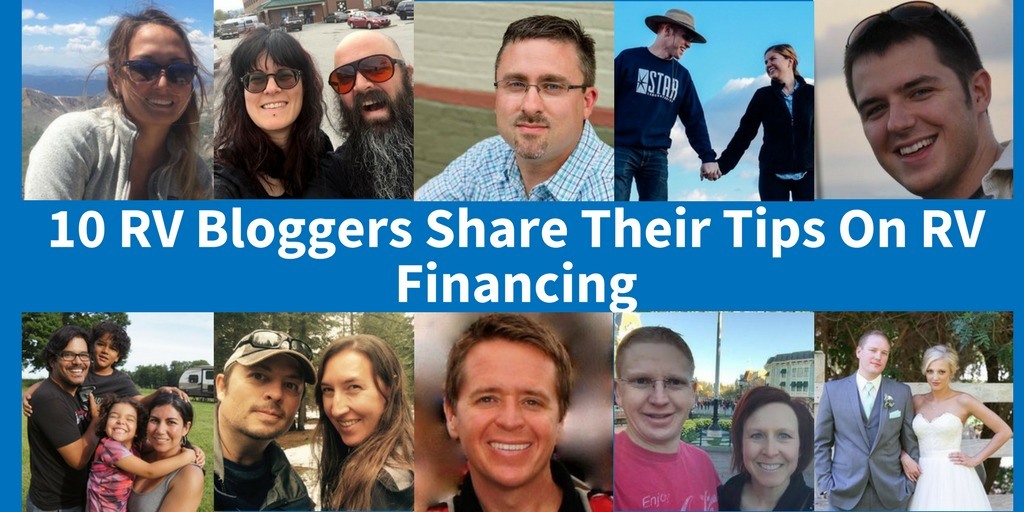Buying an RV is like buying a home. Even if you use it full-time or just on weekends, an RV is a big expense so you need to do it wisely. Proper research before buying your RV is a must. You need to be aware of all the options that you have and also you need to take into consideration all the financial needs that an RV requires after you buy it (even if is new).
For most of us, financing is an important step in becoming an RVer. With that in mind, we decided to reach out to 10 RV bloggers and ask them to share their experience with you. They talk about the mistakes they did when they were RV beginners, and about the lessons they learned. The question we asked them is:
What’s the best advice you have for an RV shopper that is considering financing their RV?
We receive some great answers that we would like to share with you.
Kevin Wallenbeck – Interact RV
I remember the time I went to get financing for our first travel trailer. It was Spring of 2007, my wife and I were super excited to get our first camper and begin making memories with our three young daughters.
We found what we thought was the ‘perfect camper’ for us and bought it right at the dealership. No questions asked, no research into interest rates, no looking around for the best finance deal. We got caught up in the excitement of the moment. Needless to say, we didn’t get the best deal on financing.
I could have gotten upset at the dealership, but the reality was it was my own choice to do what I did. The folks at the dealership weren’t responsible for doing my research and checking around for rates. Their role in the process was to sell me an RV based on the options and resources they had access to.
From that day forward my wife and I made a pact with each other. No more getting caught up in the moment and making uneducated decisions. We established a rule. We could no longer make a purchase over $99 without waiting 24 hours after making the decision to make the purchase. So, that first RV financing purchase was really a blessing in disguise and has helped us steer away from impulse buying decisions since that time.
The takeaway when looking to finance your RV purchase … press the pause button on an impulse buy and do your homework! Check interest rates at the dealership, at your bank, and at your credit union. There are now guides and checklists available online to help walk you through the RV financing process, understand the language so you can make good decisions before signing on the dotted line.
Getting yourself educated is the FIRST step to ensuring your next RV is owned by you vs owning you!Click To TweetEric and Brittany Highland – RV Wanderlust
The best advice we have for an RV shopper who is considering financing is to make sure you’re getting the best value for your investment.
A new RV can be extremely attractive: no one has ever driven it but you, so you can be sure it’s treated well. Click To TweetAlso, you get to take advantage of the full original warranty.
Unfortunately, there are downsides to a new RV. Anyone who has purchased one will tell you there’s a “shake-down” period. There’s really no way to get around the fact that you’re buying a house on wheels, with thousands of little parts that often loosen or break on the road.
So while that original warranty may give you peace of mind, new RV owners sometimes find themselves in the shop for the greater part of the first year. Talk about a rude awakening. Depreciation is also an important consideration. RversOnline.org reports RVs depreciate 18% in year one, another 10% in year two, and 7% in year three, before depreciation levels out.
Our conclusion: buying and financing a used rig about three years old is a smart move. Let someone else take the hit on depreciation and initial repairs, so you can enjoy your travels!
Jason and Rae Miller – The Getaway Couple
We went down the path of financing our fifth wheel and are glad we did. It was a big decision though and we spent almost a year doing our research before actually making our purchase. We have three key pieces of advice if you are considering financing an RV of your own.
1. Take the time to find your perfect RV so you don't end up having buyers remorse.Click To TweetBesides buying a home, this could be the largest purchase you make. Explore multiple brands, floorplans, and amenities to ensure you are getting everything you want out of an RV.
2. Once you do find your perfect RV, ignore the MSRP sticker! If you’re buying new, you can sometimes get $20-$30 thousand off of the MSRP (we did). Reach out to multiple RV dealers that have the model RV you want and ask them for their best price; don’t be afraid to reach out to dealers in your surrounding state as well. The dealership that truly wants your business will match the lowest offer you received. Don’t ever feel pressured you will lose an offer from a dealership if you don’t take it then and there. RV salesmen use many tactics to make you feel you’re walking out on a great deal. Stand your ground and remember you are the one with the control.
3. Our last piece of advice regarding financing is the relationship between the amount you’re financing and your loan term. You want to ensure you are getting the lowest payment for the longest term. If you finance over $50K you can get a 20-year term on your loan. If you’re looking at RVs that are just slightly lower than that we would actually advise to spend a little more to qualify for the longer term loan so your payment will significantly drop. If you’re looking at an RV that’s more than $50K then put down as much as you can to get your financed amount back down to $50K, this ensures you’re getting the lowest payment for the longest term. This principle applies for $25K at 15 years and $15K at 12 years as well. However, we do want to add that If you have the financial ability to take on a large payment then do try to finance as little as possible at the shortest term; this will save you a good amount on interest. Most folks aren’t able to do that though which is why we recommend the above guidelines.
Nemek Nowaczyk – Camper Champ
I’m a bit more biased because my business encourages people to hire their motorhomes/RVs, but for those who want to purchase an RV on finance, I’d recommend the following.
The finance amount can be similar to a mortgage if you choose to invest in one that’s at the higher end of the market.
Secondly, if you want to save a bit of money, consider purchasing a second-hand RV. Even one that is less than 3 years old can save you a few thousand dollars. It might also improve your financing options.
I’m not a huge fan of taking personal loans from institutions. But definitely shop around to see what your best options are. The dealers may have an exclusive arrangement with a financier and offer competitive rates. The bank’s personal loans are generally quite high. There’s also the option to purchase through a credit card (if you have a high credit limit), although you will also be subject to fees and potentially high repayment rates.
Another option is to finance the loan through family or friends at a rate that’s lower than the financial institutions. Although you need to be careful as money issues can cause problems.
When you are considering getting finance for the RV, don’t just think about the repayment amount. You need to think of maintenance, insurance and registration costs. So the amount that you pay could be inflated by another 5-10%.
Heath & Alyssa
Investigate all of your options.
When we bought our Winnebago, we were 24 years old and we didn't have enough credit history for such a big loan.Click To TweetSince you can’t co-sign an RV loan, the whole deal was on the edge of falling through.
Then Heath found something called co-buying, which was a financial loophole that let his dad co-sign our loan so the bank would approve us. It was messy and required a lot of Google searches, but we got our rig!
Laura Nunemaker – VeganRV
We live full-time in our RV and chose one we could afford to buy with cash on hand. But we can see some reasons why someone may want to finance their RV.
You have a home sale pending. If you know you will have the money to pay off the loan maybe financing will be a good choice for you. It’s much more challenging to sell a house while you’re still living in it so it might be worth financing your RV if it gets you completely out of the house.
You can get an extremely low-interest rate. People that are savvy investors can often make more money off of their money than they would pay in interest on a loan. If you’re that person, financing might be a good choice for you.
On the other hand, many people might want to finance because they want a brand new RV. Click To TweetNew RVs depreciate a ton, much more than a new car. If you only plan to use it a year or two and then sell it, you will probably owe quite a bit more than a buyer will pay for it.
You’ve heard the term “house poor.” That monthly payment can restrict your fun. We moved into our RV to have adventures and see the country. Because we don’t have a monthly payment, we have more freedom to pay for experiences. And if our income is ever reduced, we can easily live more frugally by camping on free government land and cooking all of our meals. We won’t have the stress of an additional payment.
Kara and Jesse Vincent
If you finance your maximum it does not leave anything for the costs of travel, or the hidden costs associated with RV ownership.
One thing that many people do not realize as well is that you can write off your interest on an RV loan. Click To TweetThe reason that you are able to do this is that it has a bathroom in it. By having the bathroom it counts as a second home. Because of this, I do not take steps to pay off my 5th wheel as early as my truck for example. I can not write off the interest on my truck and like most people, I really need the write-offs.
Storage of your RV can also cut your monthly expenses if you do not live in it full time. Monthly rates vary drastically based off of the quality of storage. I recently built an RV Parking strip along my house and it cost upwards of $5,000. Yearly maintenance on an RV will on the low end be at least one month’s payment. If you are maxing your payments then it leaves very little wiggle room for the cost of repairs and more importantly the cost of preventative maintenance.
Do not ever refer to your RV as an investment. An investment makes you money. You will not make money off of your RV they will depreciate in value faster than you want to think. The RV is always worth more to you that people are willing to pay for it. It is a toy and depreciates like a toy will.
Michelle Schroeder-Gardner – Making Sense of Cents
My top piece of advice when an RV shopper is considering financing their RV would be to make sure that they can actually afford it.
Financing can make a big amount seem manageable, but in many cases, it is not.Click To TweetFor example, that $100,000 RV may seem more manageable with a $400 monthly payment, but that doesn’t mean that it actually is. You should think about the full cost.
The full cost may include your monthly payment, the upfront deposit (which is usually between at least 10% to 20%), ongoing maintenance costs (oil changes aren’t cheap on an RV!), repair costs (tires are expensive for RVs, and things often break and won’t always be covered under a warranty even if you have one), insurance (full-time insurance will most likely be higher than part-time RV insurance), towing insurance, and more.
Also, if you obtain a long financing term when financing an RV, such as 20 years, how will that RV depreciate over those 20 years? It most likely will lose the majority of its value and you’ll still be paying a high monthly payment on it. Of course, that is all if you even keep the RV for that long of a period.
Mark Koep – Campground Views
Don’t. Even if you are going full-time and this will be your home on wheels… don’t.
RVs, even the nicest ones, are depreciating assets that lose significant value in the first few years of ownership. If you don’t have the cash to buy the unit outright financing is not a solution. Look at a smaller unit with fewer bells and whistles that you can pay for completely.
If on the other hand you still want to finance a RV or trailer here are my suggestions:
1. Shop around for rates.
Like buying a house or car you do have many options available for financing an RV. Click To TweetConsider credit unions and your personal bank for opportunities for better rates.
2. If you must finance consider other ways to flip the transaction into an asset. What does this mean? Instead of “buying a RV” why not “buy an investment”. Investments make money and have a return. Thanks to the proliferation of RV rental marketplaces you have a genuine opportunity to rent your RV, have it insured during the rental, and make significant income. Instead of financing a depreciating asset you suddenly are financing a business investment in something that can more than pay for itself.
3. Speak with your accountant about vacation home/ second home deductions that may be available. Depending upon your personal financial situation you may be able to deduct a certain amount of your RV payments or interest form your taxes.
4. Choose the right place and right time to buy. When financing it is easy to think “it is only $200 per month”. Instead, you should find the exact unit you want, arrange your financing in advance and then shop for price. If you can find a deal that saves you $5-$10 thousand dollars that extra savings will go a long way toward allowing you to pay the unit off quickly.
Robert & Jessica Meinhofer – Exploring The Local Life
RV Ownership can be a big leap financially, in lifestyle, or in both!Click To TweetWhen financing your RV purchase, it is very important to layout not only the RV financing plan but ensuring it fits in with your household budget.
Whether the RV will be your house on wheels, or if it is a weekender, you won’t be able to enjoy it if making the monthly payments becomes a source of family stress.
Ensuring you’ve budgeted realistically, and built in an emergency reserve for anything unexpected (mechanical, excessive travel expenses, or excessive splurging) will help ensure a good financing experience.
Thank you to all the RV bloggers that replied to this interview! Let us know in the comments below if you need any help with help with buying an RV. Remember sharing is caring. We would love if you could help us share this post on social media.
Share with us your thoughts and concerns about RV Financing in the comments below!












